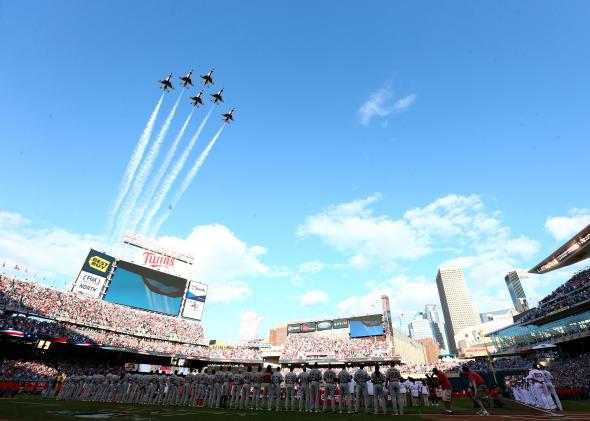Lagging behind the other professional sports leagues when it came to LGBTQ issues, Major League Baseball took a major step in the right direction yesterday. At a press conference before the 85th annual All-Star game, Commissioner Bud Selig named openly gay former player Billy Bean the league’s “ambassador for inclusion.” Selig also used the moment to recognize the late Glenn Burke, whose openness was well ahead of its time in professional sports. “Your brother was a pioneer,” Selig told Burke’s sister, Lutha. “We remember him to this day, and we want to tell his story.” Great! Now if only there were some way to get the word out. Something like a national TV broadcast.
Early last month, I called on the league to formally recognize Glenn Burke. Yesterday, it happened. I was thrilled to see how MLB would honor Burke during the All-Star game telecast. It started off well enough. A giant rainbow formed over the stadium on Monday. Yesterday, Broadway star Idina Menzel sang the National Anthem and a meandering rendition of “Forever Young.” Was baseball about to have its coming-out moment on a Fox broadcast anchored by Joe Buck? As the New York Times first reported on Monday, Glenn Burke’s family members were invited to attend the week’s festivities. After nothing happened during the endless pre-game show, I waited to see if Fox would cut away during the game to acknowledge their presence.
Like an eager lobbyist waiting for his cause to be mentioned in the State of the Union address, I felt my excitement waning with each standing ovation. The ovations on this occasion were for outgoing Yankees legend Derek Jeter. While his recognition was well deserved, Fox practically turned the broadcast into a worship service, pausing every few seconds to talk about The Captain’s legacy. Between extended ads for Guardians of the Galaxy, what seemed like thousands of Pepsi promos, and an interview with Selig conducted in his plush box seat, there was surely ample opportunity to make a quick 10-second mention of Bean, Burke, or Burke’s family in the stands. But it didn’t happen.
Let’s not demonize MLB for doing a good thing. They’re finally making a genuine effort on the LGBTQ front. But gay fans and players aren’t the only people who need to hear Burke’s story. While any gay person with Internet access or a New York Times subscription surely heard the news, it’d be easy for the average baseball fan to miss it entirely. If MLB wants to tell Burke’s story—as Selig claimed—they need to do so with more than a press conference.
Perhaps the Fox broadcasting crew simply failed to mentioned Burke or Bean during the broadcast. Regardless, some sort of on-the-field ceremony would’ve sent a stronger message about the league’s inclusivity effort. While some will cite this as an example of entitled, in-your-face gay activism—why should my child have to hear about a homosexual at a ballgame? Can’t you just be happy with the press conference and shut up?–it’s really no different from the league’s celebration of other historically marginalized groups. And hey, maybe a little controversy would give people a reason to tune in to the game. Baseball has a storied and diverse history, full of both pride and pain. Sharing the story of one of the game’s bravest players would go a long way to acknowledging the struggles gay athletes have confronted over the years. Burke never overcame the tremendous adversity he faced, but his legacy can help ensure that today’s gay athletes don’t face it alone.
